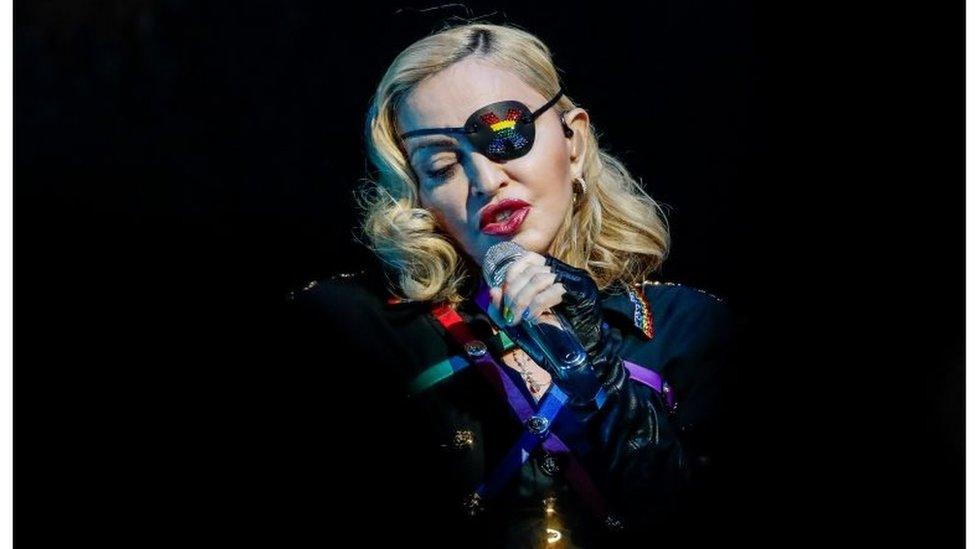Madonna: Will Gompertz reviews the star's show at the London Palladium ★★★★★
- Published
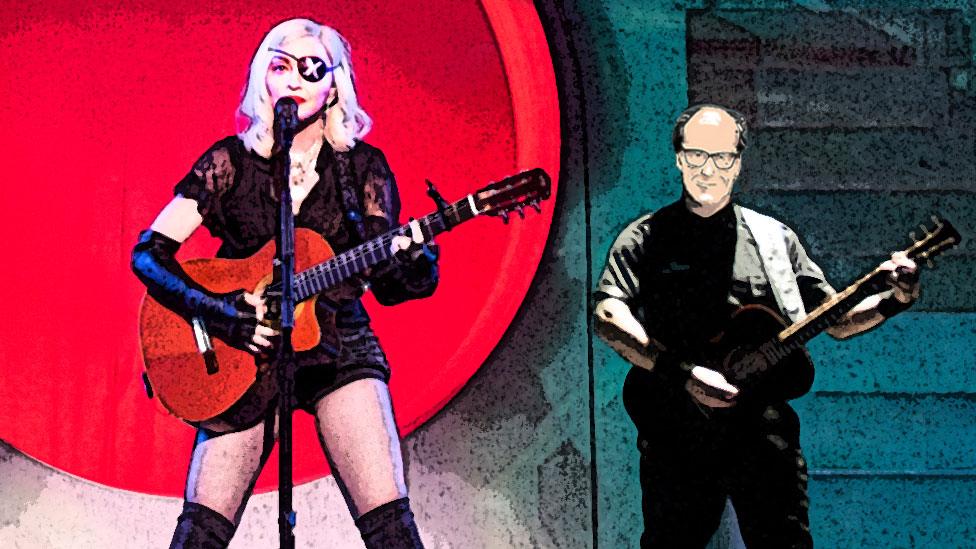
"She is here, isn't she Will?", asked a worried looking man at the London Palladium at about 20:00 on Wednesday night. "Yes", I said. I didn't actually know for sure, but he looked so anxious I thought a bit of reassurance wouldn't go amiss.
Anyway, the merch counter had just fallen over and there was a rising sense of calamity which didn't need adding to.
Madonna goes deep with her fans. The connection is genuine and mutual. Nobody blames her for cancelling shows due to extreme pain in her knees and hips, people just hope it's not on their night (she has subsequently ruled out shows on 4 and 11 February).
"I feel so guilty," another fan told me. "My mates had tickets for Monday night, which was cancelled and I've just sent a WhatsApp of my seat tonight."
"Where are you sitting?" I asked
"Row U in the stalls," he said
"How much did you pay?"
"£250" he said "Not bad eh? I think it's going to be great."
And it was - 5-star great.
Not because the show was perfect, though. Madonna's movement was visibly stiff, lighting errors left dancers in the dark, and some of her banter fell flat. All of which only added to the "live-ness" of the event, which was more an evening of intimate cabaret than a stadium blockbuster show.
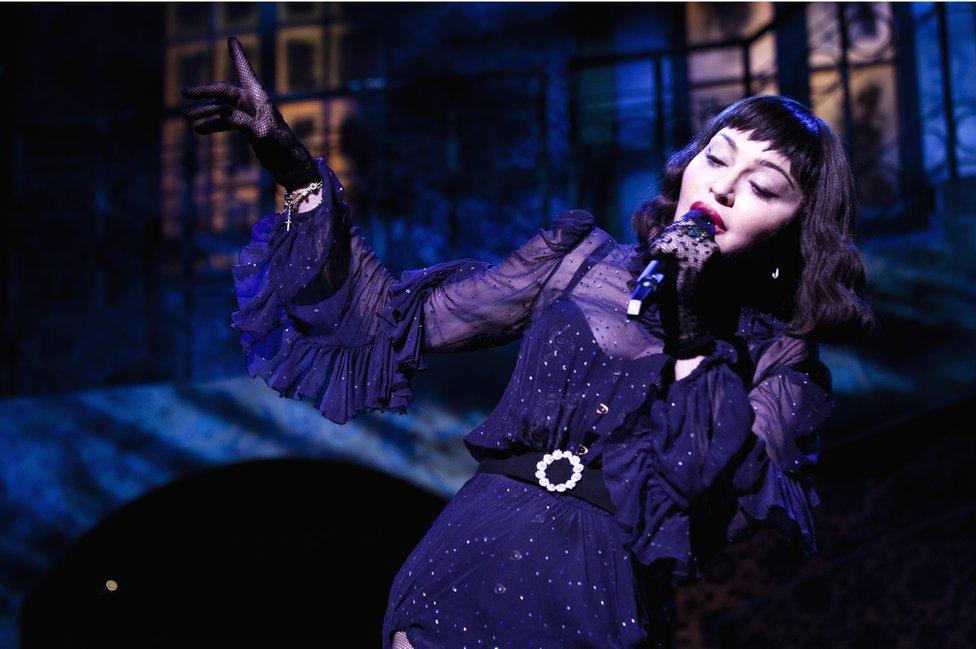
Madonna's Madame X tour
It was perfectly imperfect, like one of those sketchy landscapes by Cezanne where you can see his underdrawings and misplaced lines, making it so much more beautiful and real than Canaletto's soulless precision.
Truth is the point of art, not perfection.


Madonna's creation evokes the imperfections in Cezanne's sketchy landscapes (The Brook, c. 1895-1900)

Getting to it sometimes means removing the artifice, or strapping it on. Madonna's schtick has always been the latter.
She's a post-modernist right down to her kinky boots, adopting superficial personas and cultural influences. She is the Cindy Sherman of pop, the chameleon Queen with a debt to the shape-shifting aesthetics of David Bowie.
This time around, though, Madonna has let the mask slip.
There's still a character for her to hide behind (Madame X, a dominatrix type cliche sporting an eye-patch and padded pants), with its usual mix of the sacred and the profane (she is both a prostitute and a nun). But she constantly undermines her own illusion just as Cezanne did with his fidgety, cross-hatched lines.
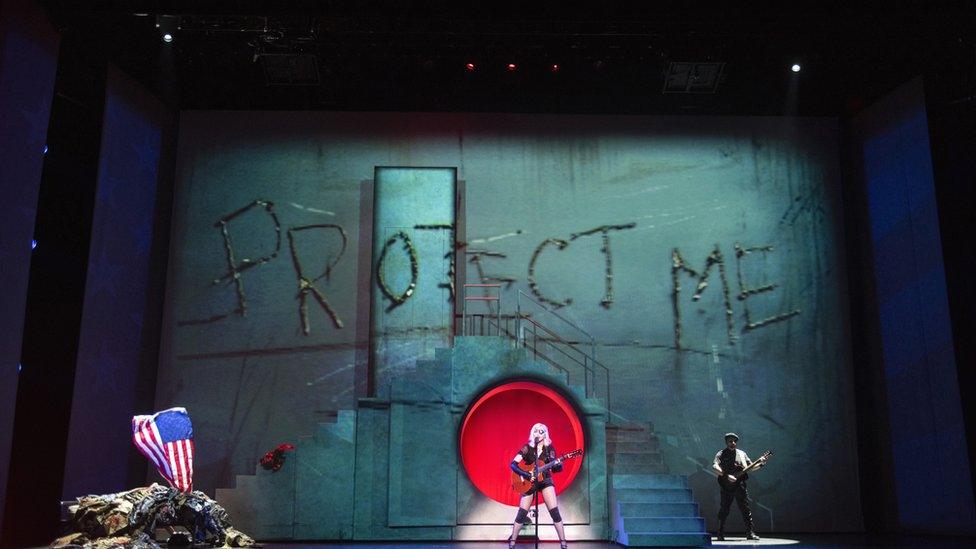
One minute she is the all-singing, all-dancing Madame X, inhabiting a vividly theatrical world embellished with huge projections. The next she has stepped beyond her own fourth wall to have a chummy chat with the locals. It's improv, kind of. The audience interaction is a pre-conceived element of the show, but her spiel is site-specific, and her responses spontaneous.
The artist was present in every sense.
Sometimes it worked.
Sometimes she went on for a too long, leading to the occasional "get on with it". And sometimes it was awkward: "Does anyone have a spare seat I could sit in?" she asked (scripted).
A chap near the front put his hand up. Madonna gingerly stepped down from the stage for a tete-a-tete. She's fine, he's star-struck. Beer is swigged (scripted). To no avail. His tongue has tied itself into a knot so tight no amount of liquor is going to loosen it. A stilted conversation ensues (unscripted).
Nobody minds. Madonna's doing stand-up. We're in the room. She is with us, of us, not some distant star on a faraway stage performing a risk-free romp through back catalogue favourites with a few numbers from the latest album thrown in to help sales.
The Madame X Tour is an adventurous piece of contemporary theatre, and a match for any of the Tony and Olivier-winning shows currently playing the West End and Broadway.
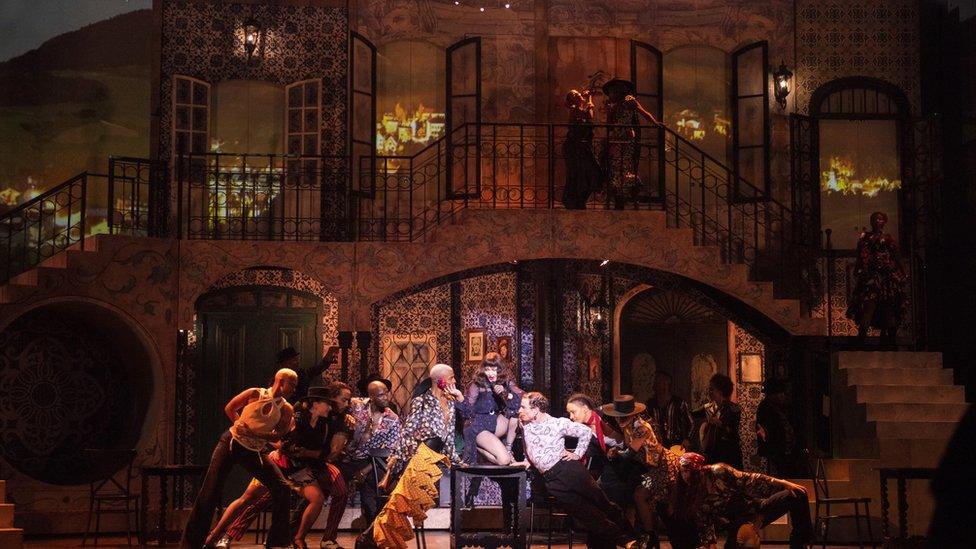
Madame X show is a theatrical spectacle
It starts with a Hitchcockian scene. Madonna is stage right, in profile: seated, visible only as a silhouette behind a translucent curtain. She is typing. Slowly. A gunshot rings out every time she strikes a key, provoking a robotic movement made by a single besuited dancer standing in front of the curtain, stage left.
Text is projected on high as the dancer contorts his body under a hail of literary bullets, most fired decades ago by James Baldwin, one of America's finest post-war writers. His words "Artists are here to disturb the peace" appear as an epigraph.
He is right. Up to a point. Which is about 23:00 for Westminster City Council, according to our celebrated hostess. She told us an iron curtain would be dropped if she went on beyond its stipulated curfew.
The diaphanous fabric lifts, Madonna struts, the stage is set, and the show proper begins with God Control. The audience goes nuts ("I should have done this years ago," says the singer as an aside), as the steps and structures revolve and animate.
Dark Ballet comes next in a show built around her recent Madame X Album. The smattering of old favourites stitched into its fabric have been incorporated so elegantly as to make them feel an essential part of the whole rather than crowd-pleasing add-ons.
And so it is with Human Nature, which follows and resolves in a seated scene that doubles up as a rest for the star and a witty nod for the die-hards towards the famous 1995 video directed by Jean-Baptiste Mondino.
Then comes some "Hello London" repartee before an a cappella version of Express Yourself.
It's good, and it gets better.
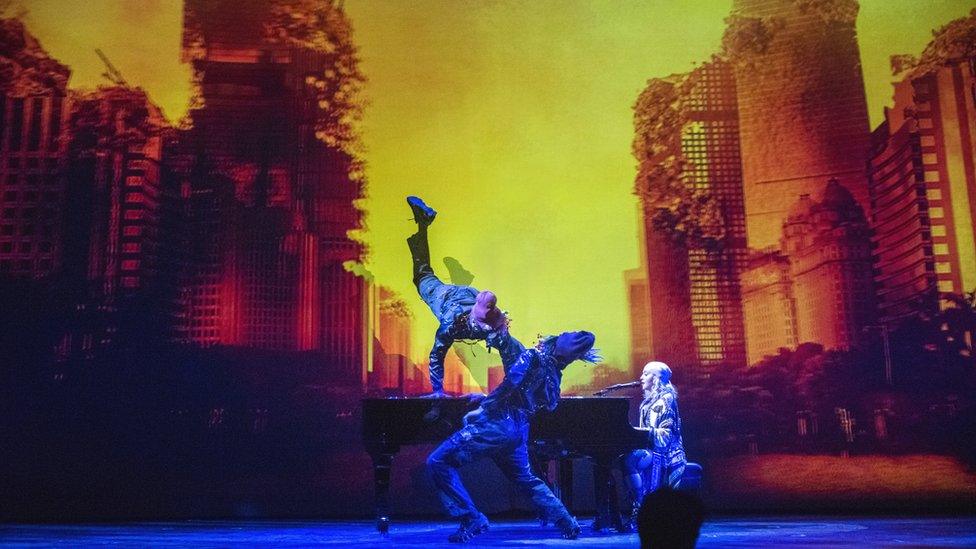
A string introduction to Papa Don't Preach segues into a sophisticated rendition of Vogue performed in a striking, angular, black and white design.
Not all the creative decisions are made so astutely. There's an ill-advised, wince-inducing vignette, which sees Madonna launching into a "let's wind back the years" routine involving an upside-down-splits topped-off with toe wiggle. I felt a tweak in my own groin - and not in a good way.
Fortunately for Madame X, and us, such moments are few and far between. This show is designed (and constantly redesigned) around the 61-year-old's physical condition. Dancers help her on and off pianos, chairs and steps. You can sense her frustration at her body's restricted ability, but she can still hit the beats better than most.
Plus, her team of dancers are fantastic. They excel under Megan Lawson's choreographic vision, which appears to riff on a revered contemporary dance cannon including such notables as Pina Bausch's The Rite of Spring, Hofesh Shechter's Sun, and Michael Jackson's moon walk.
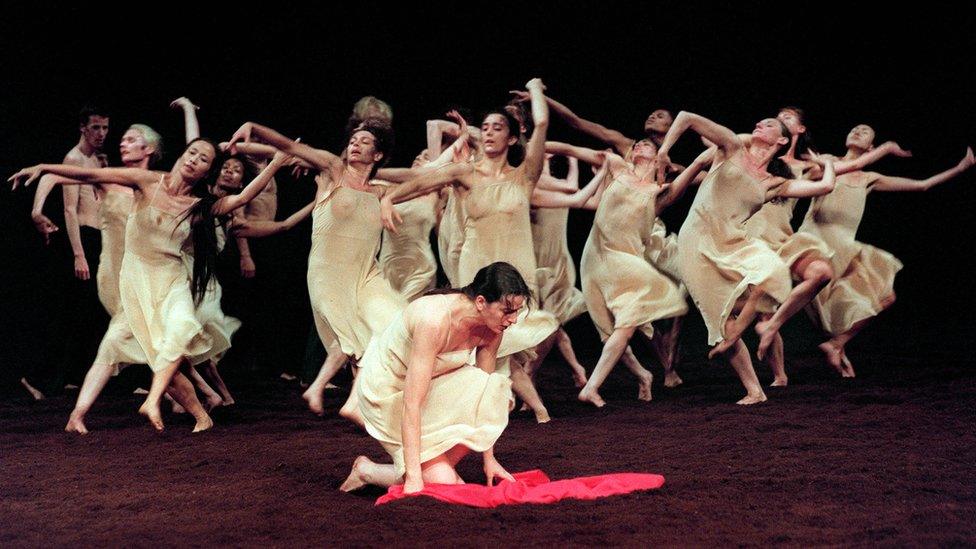
The influence of Pina Bausch's The Rite of Spring can be seen in the choreography of Madonna's show

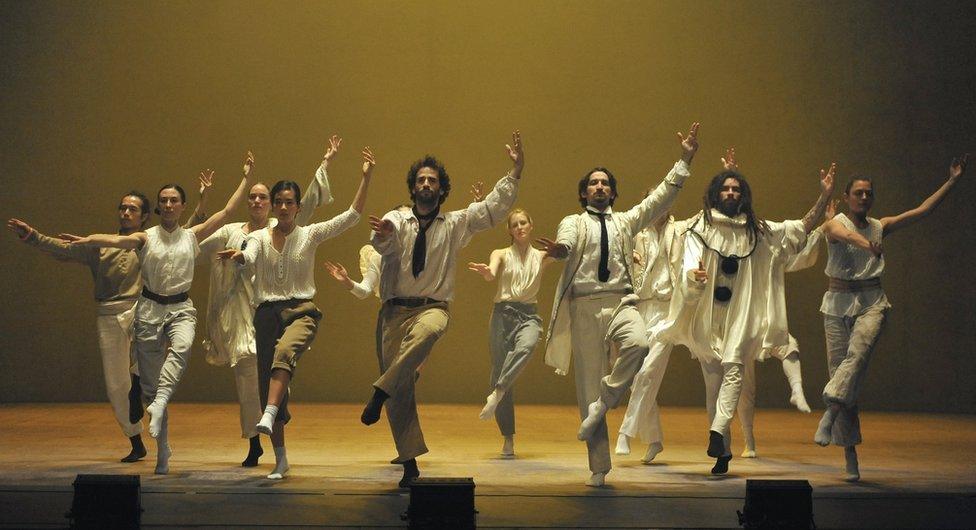
Hofesh Shechter said his work Sun questioned "the very essence of art or dance, what it is and how it's supposed to look and feel"
The heart and soul of the show is provided by Madonna's newly found love: the evocative sound of the Fado musicians she discovered in her current home city of Lisbon.
That, and the wonderful female Batuque singers from Cape Verde, an African archipelago once colonised by the Portuguese who took an unfavourable view of their traditional music.
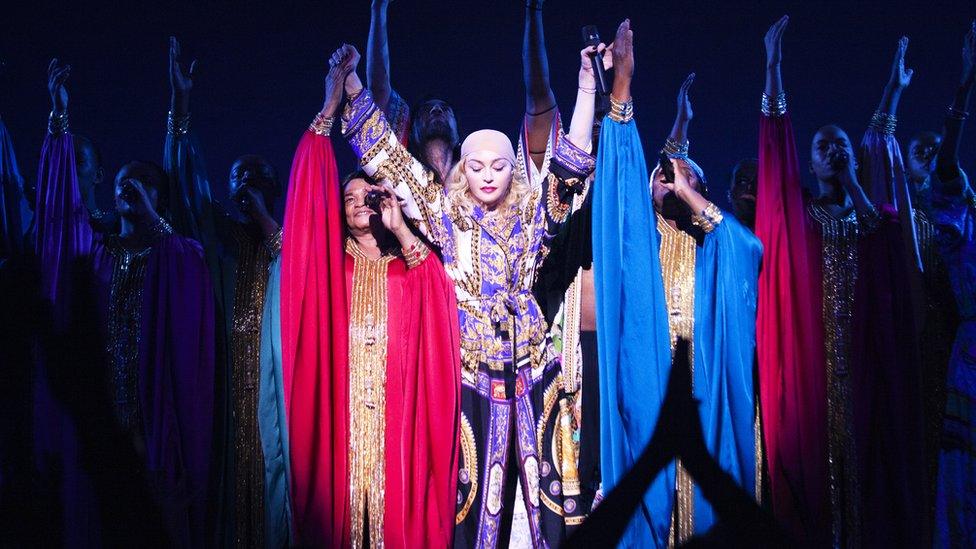
The star's show is infused with her love of Fado music, which originated in Portugal around the 1820s, and is known for being deeply melancholic
The show ends with a full-bodied version of Like a Prayer, which leads into an encore of Madame X's protest song, I Rise.
Which we all did as a visibly delighted Madonna led her merry band of players out of the auditorium and off into the night (or the physio's bench).
Pictures in this review are from other venues in the Madame X tour.
Recent reviews by Will Gompertz
Follow Will Gompertz on Twitter, external
- Published30 January 2020
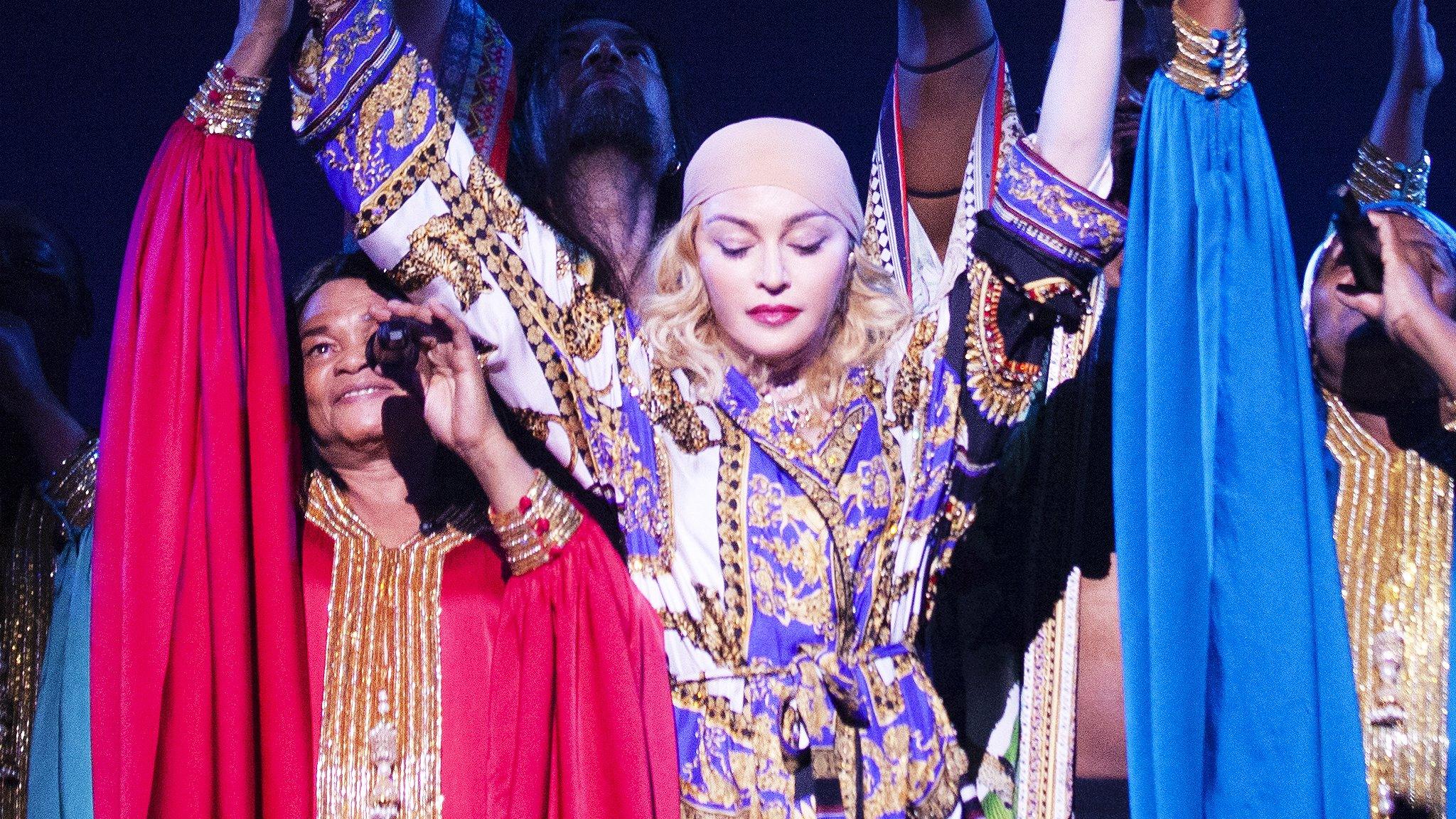
- Published25 January 2020
